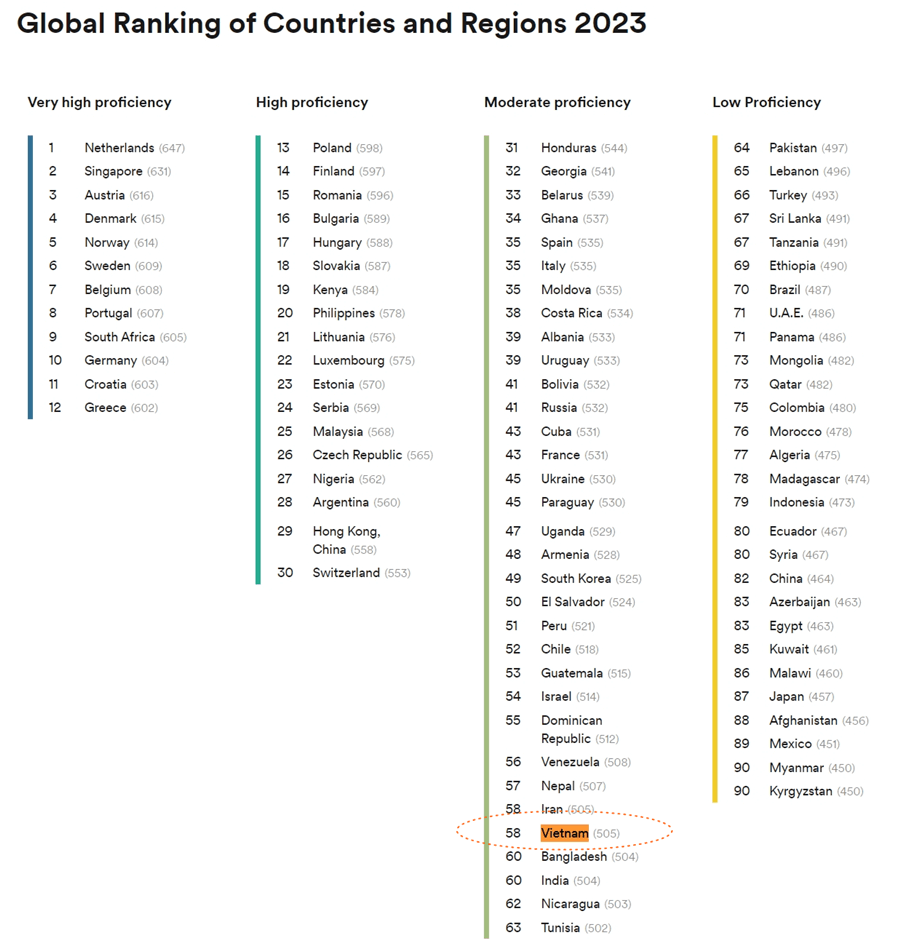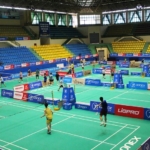Teaching and learning English in Vietnam seems to take the exam but does not focus on other skills, such as listening and speaking. This main cause contributes to reducing the quality of English teaching.
Vietnamdrive collects information on teaching and learning English in Vietnam to introduce to you, including the causes and effects and the ways to improve these skills, which can save the time of English teachers or entrepreneurs who want to have an overview before investing in Vietnam or helping students.

The purpose of learning English is to work and partly for fun for most people in the world. None of us study English to take the test. Also, the test is only a form of assessment used to check the quality of teaching and learning. However, high schools in Vietnam do the opposite way.
1. Benefits of learning English in Vietnam
Learning English is important because it contributes to bringing Vietnamese people into the world.
Using English well also helps learners get jobs more easily and opportunities to change their status in life.
Currently, multinational economic groups use English as the language of communication.
Most countries that use English well have a better quality of life, which can contribute to improving the standard of life of the Vietnamese when most people can speak English fluently.
Nowadays, many young students in Vietnam learn English with IELTS certificates to get a better chance to pass the conditions of international schools to fulfill their studies.
Also, many others learn it to move to live in other English-speaking countries, such as the United States, Canada, New Zealand, or Australia.
In general, English gives plenty of benefits for Vietnamese learners. Depending on their purposes, they find it beneficial to work, study, move to other countries, or communicate.
2. Studying English in Vietnam and its results
The first time was in the 19th century when the Vietnamese studied English. During the French colony, the people primarily began to learn English in the interpreter school besides French.
Before 1959, students in the South could choose to study English as a foreign language from 6th grade. However, in the same period in the North, only a few places taught English.
From 1975 to about 1986, the number of students choosing to study English as a second foreign language was not much.
But, since 1986, English has become the main foreign language at the school in the national education system and was one of the important subjects chosen in the exams.
However, it seems that teaching and learning English until now has not got good results.
According to the EF report in 2023, the level of English proficiency of Vietnamese people is ranked 58 out of more than 113 countries, belonging to the average proficiency level. Vietnam stands right above Bangladesh and has the same rank as Iran.

In general, Vietnamese students’ ability to use English is still weak; most students can study English at university, but their ability to speak it with foreigners seems impossible for most students if they are not majoring in the English language.
The English level of graduates has not met the needs of the job. Most students can read and understand some documents, but many cannot communicate, write, and speak well.
The English proficiency of the majority of students does not meet the requirements. The testing forms are somewhat different but reflect the general picture of ineffective teaching and learning of English in the education system in Vietnam.
So, why is teaching and learning English in Vietnam inefficient?
3. Causes of ineffectiveness in teaching and studying English
In Vietnam, the results of teaching and studying English are evaluated in grammar and reading comprehension. Therefore, the whole education system has not invested effectively in teaching this language focusing on vital skills of listening, speaking, and writing.
Besides, teachers teaching English seem only to take the test, so they do not invest in other skills, especially listening and speaking. Even though, many teachers in the schools cannot speak English fluently with foreigners, which influences the quality of teaching and may affect learners’ abilities.
Also, class sizes in Vietnam are large (often over 30 students per class), and there is no assistive technology, so it is difficult to teach language skills effectively.
Passive students mainly learn to get points for passing English subjects, not to use practical language skills. Thus, teachers do not have the motivation to improve their qualifications and teaching methods.
Why don’t students learn relevant skills for practicing English? Although most of them want to be good at practicing foreign languages, they have to study for exams due to exam pressure.
Although people who know English will get jobs more easily, if they do not know a foreign language, they can work for Vietnamese companies where English is unnecessary.
Besides, many organizations give the standards of English qualifications, such as A, B, and C, without paying attention to practical ability, so most of the candidates can meet.
4. Is the English learning ability of Vietnamese people low?
The ability to learn languages is always available in every ordinary person. Anyone who can use Vietnamese will be able to learn English.
Children living in any language environment will be able to develop the ability to use that language naturally. Vietnamese children born and raised in the UK, Australia, or the US can speak English fluently like native speakers. If they were born and raised in countries like France or Germany, they can speak French or German like the natives.
These proofs show that the ineffective learning of English in Vietnam is caused by the way of teaching, how to learn, and the educational environment rather than the limited language ability.
5. Solutions to teach and learn English in Vietnam better
The reason is that both English-language learners and instructors aim to take the exam. Thus, the easiest and quickest way is to change the form of tests, assessments, and examinations in all education systems of the English subject.
Testing and evaluating all skills of English, not only writing, reading, and grammar. Depending on age and level of education, we should have a different form of teaching and assessment. First is pronunciation, listening, speaking, reading, writing, and then grammar. However, many schools and English centers teach grammar, writing, reading, and other skills for the last.
In the recruitment of companies, candidates should undergo practical competency assessments: listening, speaking, reading, and writing.
Of course, when changing the form of examination and assessment, teachers must be trained in professional development and improve facilities suitable for the new requirements of teaching and learning English.
What are your ideas about teaching and studying English in Vietnam? If you have any ideas, you are welcome.
Also, if you want to support English-language learners when you visit Vietnam, that is great. To do this, please arrange your short time to tell or help students speak and practice English when they tell you on the streets. Thank you!







